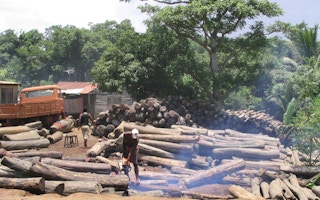In a decision that environmentalists say sets a “dangerous precedent” against efforts to stop trafficking in illegal timber, a court in Singapore has okayed the release of a large shipment of rosewood from Madagascar.
The timber, which was seized by authorities in Singapore more than a year ago, was shipped despite both a national ban on such exports and a lack of permits.
According to a report in the Straits Times, Singapore District Judge Jasvender Kaur dismissed the case against Wong Wee Keong and his company, Kong Hoo, for importing some 30,000 rosewood logs worth more than $50 million from Madagascar in March 2014.
The judge “dismissed the case without calling for the defense”, which the newspaper called “a rare outcome.”
The decision rested on the argument that the shipment was in transit to Hong Kong and not intended for import to Singapore.
“There was no evidence to establish that the logs were imported into Singapore,” said the judge. “Accordingly, a permit was not required.”
The ruling sparked immediate criticism from the Environmental Investigative Agency (EIA), an non-profit that has been tracking the illegal timber trade, including a special focus on rosewood trafficking from Madagascar.
“With this verdict, Singapore has declared its ports open for laundering illegal timber, in blatant disregard of the clear ban on export of Malagasy rosewood,” Kate Horner, Director of Forest Campaigns at EIA-US.
“The crisis of illegal logging in Madagascar will continue so long as international markets allow illicit timber to be trafficked into and through their borders. Singapore is both running afoul of international law and undermining any nascent attempts at good forest governance in Madagascar.”
EIA’s argument is based on that fact that both Madagascar and Singapore are signatories of the Convention on International Trade in Endangered Species of Wild Fauna and Flora or CITES.
Trade in Malagasy rosewood is restricted under CITES, meaning that special permits are required for import and export.
According to the CITES Secretariat, there has been a zero export quota for several Malagasy rosewood and ebony species since August 2013. Additionally, rosewood exports are banned under a March 2010 decree enacted following a burst in illegal logging after a 2009 political coup that displaced the president.
Nonetheless there is confusion about the legality of the shipment because last year an official delegation of officials from Madagascar came to Singapore to confirm that the rosewood had been cleared, despite the CITES export quota of zero.
Reached by Mongabay, John E. Scanlon, Secretary-General of CITES, said that while the organization can’t comment on individual court decisions, it is looking into the case in Singapore, including whether there is likely to be an appeal. He also noted concern about continued trafficking of rosewood from Madagascar.
“We do have deep concerns about the illegal trade in Malagasy rosewood, which we will report on to the 66th meeting of the CITES Standing Committee in January 2016,” he said.
“We are not only concerned about the role of the source State, but transit and destination States as well, and we are working closely with States right across the illegal supply chain in this regard.”
“Speaking more generally, we are conscious that there is more work to do in raising awareness and sharing experience amongst everyone involved in the enforcement and judicial process, including prosecutors and judges, inter alia, about the multifaceted economic, social and environmental impacts of crimes against wild fauna and flora that involve organized criminal groups, and of the need to treat them as serious crimes.”
EIA echoed the sentiment that courts need to do more on the issue, arguing that the decision in Singapore seems to undermine the spirit of regulations designed to stop illegal logging.
“This action is contrary to CITES transit recommendations listed in Resolution Conf. 9.7 (Rev. CoP15) which called on Member States to update their implementing legislation to allow them to seize CITES listed species transited without a valid permit,” said the group.
“Singapore’s action is in violation of their Endangered Species Act, chapter 92A, Part II, 5 (1) (a), requiring every scheduled species to have a valid CITES export permit,” EIA continued, adding that “no legal CITES export permits have ever been issued for Madagascar rosewood.”
Previous wood from Madagascar has ensnared parties elsewhere. In 2012, Gibson Guitars settled with the Department of Justice (DOJ) for violating the Lacey Act with illegal imports of Malagasy wood. The case was the first since the Lacey Act was strengthened in 2008.
Madagascar rosewood is in high demand for use in luxury furniture popular in China. Sticker prices for beds and dressers made of rosewood can easily top $200,000, according to investigative work by EIA.
The problem with rosewood logging in Madagascar is the heavy toll extraction has had on the environment and wildlife, including driving an increase in bushmeat trafficking and deforestation in protected areas.
This story was published with permission from Mongabay.com.










